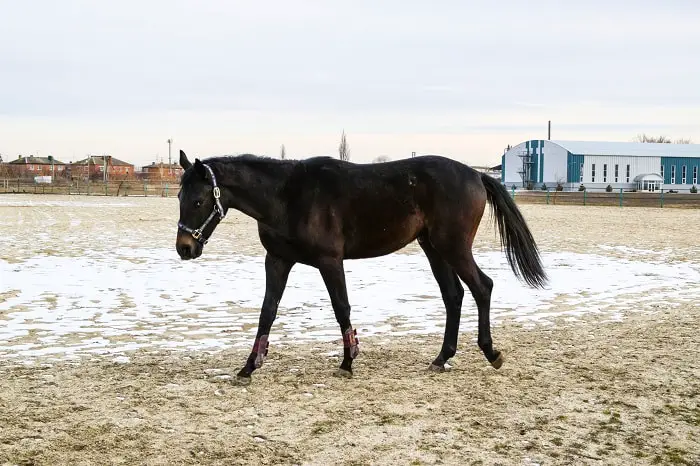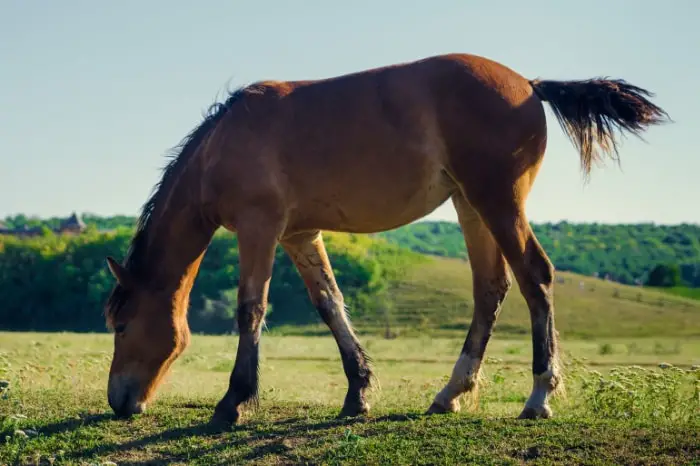Last Updated on December 26, 2022
Hair loss in horses is, unfortunately, a common occurrence and there are several factors that may cause a horse losing hair in patches. It can be something simple like environment or temperature, or something more complex like ringworm. Knowing how to treat hair loss will help your horse stay comfortable, healthy, and happy.
Whether a small patch or the majority of the body, it’s not uncommon for horses to experience hair loss. Though horses regularly shed their winter coats, hair loss outside of shedding is often problematic. It can be itchy, irritating, and can even lead to infections or be the result of an underlying disease.
Hair Loss in Horses
Hair loss in horses is often referred to as alopecia. Alopecia is complete or partial hair loss in horses where hair is normally present. Oftentimes, horses will scratch and rub the irritated areas where they are experiencing hair loss.
Hair loss can be a congenital condition or be acquired. Certain diseases can affect the hair follicles that can lead to hair loss. In other cases, certain diseases can cause horses to become itchy or irritated which can lead to rubbing or biting which in return causes hair loss.
Reasons that Can Cause Hair Loss in Horses
There are several factors that can contribute to hair loss in horses. Temperature, allergic reactions, ringworm, insect bites, dermatophilosis, fungus, stress, rain rot, ill-fitting tack, and parasites. These issues can cause small patches or large sections of hair to fall out.
This can cause excessive rubbing, biting, and scratching, as loosing hair can be very irritating to horses. Whether the issue is something simple or something more serious, it is important to treat the hair loss occurring in your horse.
In some cases, simple treatment is all that a horse needs to get rid of hair loss. In other instances, the treatment will take more time, medicine, and dedication. However, with the proper care, hair loss can be treated in horses.
How to Treat Hair Loss in Horses
The first step to treating hair loss in horses is to determine what is the issue causing it to occur. This will allow you to properly treat the issue in order for your horse’s coat to grow back to normal. Your horse will thank you once you treat the reason for their hair loss.
Treating Ringworm
One of the most common reasons for horses to loose hair is ringworm. Ringworm is a skin infection that is caused by fungus. It is highly contagious and can even be transferred to people. It must be treated with caution, to make sure it is not spread.
Ringworm can cause itchy, irritating scabs that in return lead to hair loss. These lesions can become sore and uncomfortable for horses. Most of a time a veterinarian will diagnose ringworm and then treatment will ensue.
When treating ringworm, be certain to not share any of the brushes, tack or equipment your horse uses, as it can spread to people and other horses that way. Treatment for ringworm typically involves using antibiotics, iodine, anti-fungal shampoo, and creams. Treatment will often take several weeks and gloves should be worn during the process.
Once the ringworm has been treated, the hair will grow back. It will take some time, but ringworm can be successfully treated.
Treating Rain Rot
Rain rot is a bacterial infection that occurs in the skin of horses. Any horses, no matter their age or location, can develop rain rot. It most commonly spreads in warm, wet environments.
Though people think it only occurs to horses that get stuck in rain, there are many other reasons that can cause rain rot to occur in horses. When the skin becomes wet and saturated and is broken by bug bites or cuts, it allows bacteria to get in. This is what leads to rain rot forming.
Rain rot is capable of spreading from one horse to another. It is important to make sure not to share blankets, brushes, and tack to prevent spreading. It often affects the back, head, and neck.
To treat rain rot, apply antibacterial soap and remove the scabs off your horse. It will typically heal over time with regular grooming and bathing.
Treating Fungus
A fungus is a common condition that many horses suffer from and there are many different types that can occur. It can often cause hair loss in small patches in horses. Thankfully, fungus is often simple to treat.
Fungus often develops in warm, humid environments. Many horses will develop patches of fungus in the summertime. To treat fungus, bathe your horse with an antifungal shampoo and be sure to regularly groom them.
Treating Dermatophilosis
Dermatophilosis is a bacterial infection that occurs in many animals. It often occurs in moist environments. The bacteria can lead to lesions forming on the skin and hair falling off.
To treat dermatophilosis, you should apply antibiotics and anti-fungal shampoo on your horse to treat the bacterial infection. It will take time, but over time it can be treated.
Treating Hair Loss from Bug Bites, Stress and Temperature
There are many simple causes that lead to hair loss. This includes bug bites, stress, and hot weather.
To treat hair loss from these issues, be sure to regularly groom and wash your horse, as well as provide your horse with a healthy diet and dry shelter. To help with hair loss, supplements can be given to horses to promote hair growth.
For bug bites, using a fly mask, flysheet, and fly spray can help prevent irritating bug bites that can lead to hair loss. When it comes to stress, be sure to consult your veterinarian for appropriate treatment and provide your horse with a low-stress environment. For hot weather, be sure to wash off any sweat with a mild shampoo and regularly brush your horse.
Treating A Balding Horse
There are many reasons that can lead to hair loss in horses. Some are simple issues, where others are more complex. Fortunately, there are several options available for preventing and treating hair loss to keep your horse happy and healthy.
FAQs
What promotes hair growth in horses?
Dietary factors include the level of zinc and biotin, as well as methionine (an amino acid that's important for the synthesis of keratin proteins). The amount of methionine in the diet is determined by the horse's age and whether the horse is a foal or a mature horse. Fatty acids from dietary fat are also necessary for hair growth. Vitamin A and vitamin D supplements can help prevent hair loss.
Hair growth is also closely related with levels of hormones in the body. The condition known as "baldness" is caused by an imbalance in the levels of hormones that regulate hair growth. Hormone levels fall with age, which leads to hair loss. Also, stress, poor nutrition, injury, and other conditions can lead to a reduction in hormone levels and cause hair loss.
Why is my horse losing his hair?
Horses develop bald spots when their hair follicles are damaged or infected. Some of these hair follicle problems are temporary and resolve on their own. Others are permanent.
Bald spots are visible areas of hair loss caused by a number of conditions. The most common causes of bald spots are:
• Insect bites (flea and lice)
• Skin infections
• Allergies
• Heat
• Medical conditions
The best way to care for your horse's hair is to wash it regularly, using a shampoo that is specially formulated for horses. This helps to prevent the buildup of bacteria, fungus, or other organisms in the hair shaft.
Can stress cause hair loss in horses?
Stress can cause hair loss in horses. Stress affects the endocrine system, which controls many body functions, including growth. Any change in the environment, such as heat, cold, hunger, thirst, fear, pain, or lack of sleep, can cause the body to make stress hormones. When this happens, the hormone levels become unbalanced and cause hair loss. Also, stress can damage the hair follicles and lead to permanent hair loss. This is called "telogen effluvium."
As you can see, there are many reasons why your horse may be losing his hair. It's important to know the possible causes so you can take the proper steps to prevent and/or treat the condition.
How can I make my horse's hair grow faster?
The best way to promote healthy, rapid hair growth in horses is by feeding them a high-quality forage diet that is free of toxins and chemical fertilizers. Toxins and chemicals from plants and feed can slow down or stop hair growth. A forage diet that is high in fiber and low in energy will help the horse maintain a healthy weight and help with shedding. When the horse is properly nourished, his hair follicles receive the essential materials they need to grow strong, healthy hair. Feeding your horse a high-quality forage diet also has other benefits. It promotes healthy skin, teeth, and coat. It relieves constipation and other digestive problems. And it helps your horse maintain a healthy immune system. A healthy horse has fewer health problems and lives a longer life.
Does coconut oil help horse hair grow?
In addition to promoting healthy hair growth, coconut oil also helps to relieve dry skin and coat conditions. Coconut oil can be used as a part of the daily grooming routine. Coconut oil can be applied to the hair shaft after shampooing to help promote healthy hair growth. It can be rubbed into the coat for softness and shine.


